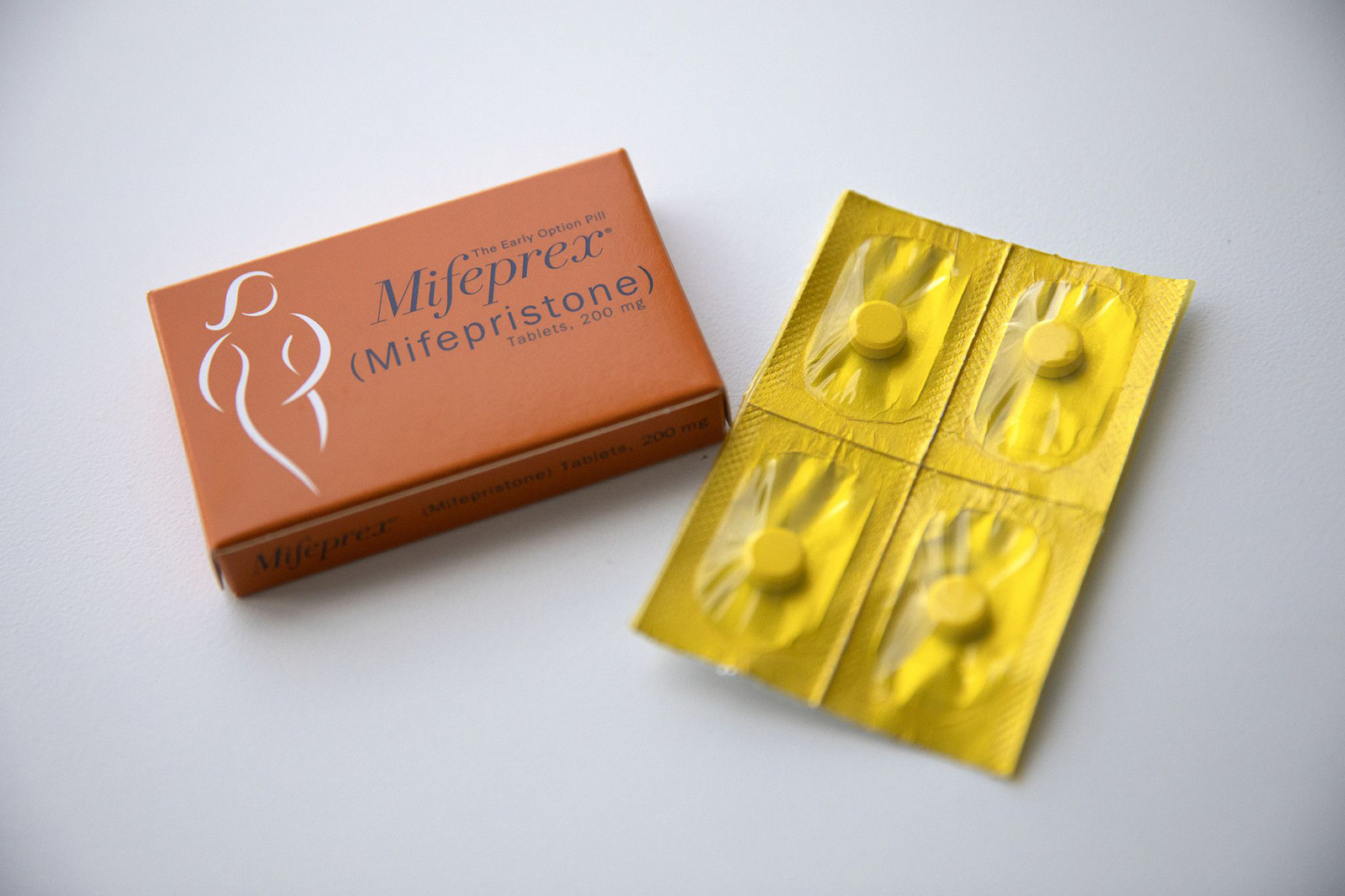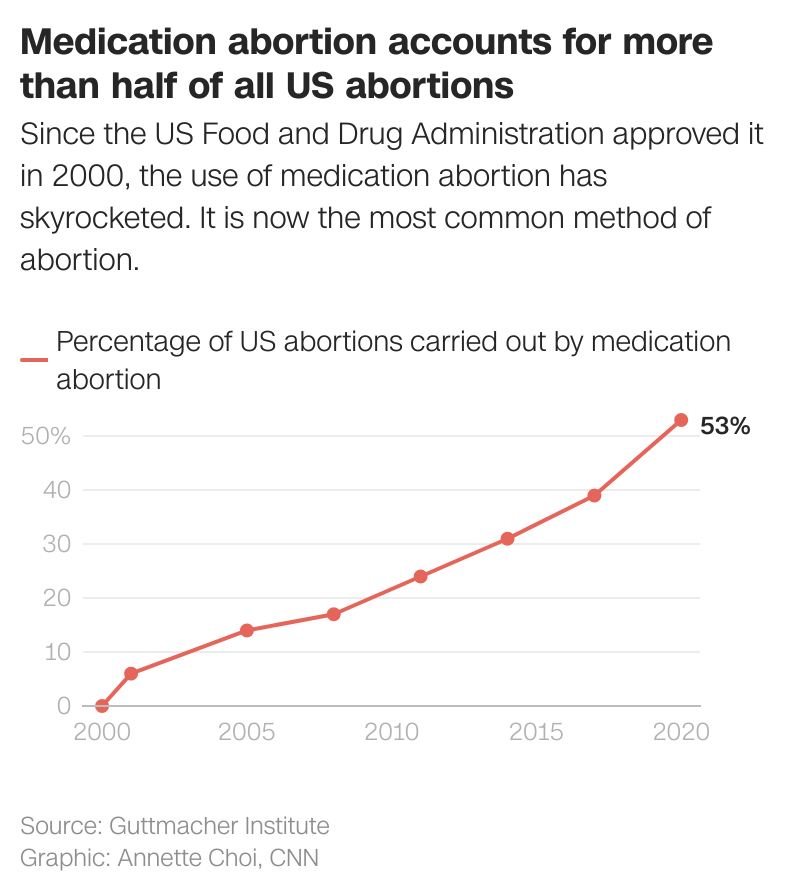How today's arguments will play out — and possible next steps
From CNN's Tierney Sneed
The medication abortion challenge, brought by anti-abortion doctors and medical associations, is arguably the most significant legal dispute concerning abortion since the Supreme Court ended nationwide abortion protections with its overturning of Roe v. Wade last summer.
Depending on how US District Judge Matthew Kacsmaryk handles the lawsuit, access could be cut off nationwide to the most common method of abortion in the United States.
The Justice Department and outside legal experts say that it would be “unprecedented” for a US district court to order that the US Food and Drug Administration rescind its approval of the drug, as the plaintiffs are asking Kacsmaryk to do.
The challengers’ request for a preliminary injunction that would force the FDA to withdraw or suspend the approval while the lawsuit plays out is before Kacsmaryk on Wednesday.
Among those listed in the case as attorneys with the Alliance Defending Freedom (ADF), the legal advocacy group representing the plaintiffs, is Erin Morrow Hawley, the wife of Republican Sen. Josh Hawley. However, the lead signatory on many of ADF’s briefs has been another attorney at the organization, Erik Baptist.
Kacsmaryk has given both sides two hours each to argue the case.
Some of the Justice Department’s time might be shared with lawyers for Danco, the drug company that has intervened. The challengers’ attorneys will be up first, and they’ll be allowed to reserve some of their two hours for rebuttal after the defendants have their chance to present to the judge.
Will the judge hint at the timing of a decision? It is always possible that Kacsmaryk will rule on the preliminary injunction from the bench during the hearing. But that is unlikely, given the high-profile nature of the case and the breadth of topics the judge has asked the lawyers to be prepared to argue on.
When he does issue his ruling, if it is an order in favor of the challengers, he could proactively put the order on pause to give the DOJ time to appeal it to the conservative-leaning 5th US Circuit Court of Appeals. If not, the department is expected to ask him, as well as the appellate court, to do so.
If Kacsmaryk rejects the plaintiffs’ request for a preliminary injunction, they will also have the opportunity to seek the immediate intervention of a higher court.
Abortion rights advocates are sounding the alarm on the medical abortion lawsuit — and its implications
From CNN's Devan Cole
 Abortion rights activist Rachel Bailey chants during an International Women's Day abortion rights demonstration at the Texas State Capitol on March 8 in Austin, Texas. (Brandon Bell/Getty Images)
Abortion rights activist Rachel Bailey chants during an International Women's Day abortion rights demonstration at the Texas State Capitol on March 8 in Austin, Texas. (Brandon Bell/Getty Images)Abortion rights advocates have sounded the alarm on the lawsuit targeting the US Food and Drug Administration's two-decade-old approval of mifepristone, the first drug in the medication abortion process.
Advocates for abortion are stressing that a ruling by US District Judge Matthew Kacsmaryk in favor of the plaintiffs would affect every corner of the country since the lawsuit is targeting a federal agency.
Kacsmaryk is holding a hearing Wednesday on the case. He is considering the plaintiffs' request for a preliminary injunction that would withdraw or suspend that FDA approval while the lawsuit plays out.
“If FDA approval of mifepristone is revoked, 64.5 million women of reproductive age in the US would lose access to medication abortion care, an exponential increase in harm overnight,” NARAL said in a statement in February, pointing to internal research.
And activists quickly mobilized in Texas around the issue, with the Women’s March holding a rally at the federal courthouse in Amarillo in February to protest the suit.
“We’ve said it before: the fight for reproductive rights now lies in the states, and legal challenges like these are just the latest example of how our fight is bigger than Roe,” said Rachel Carmona, the executive director of Women’s March.
Everything to know about the lawsuit seeking to block the use of a medication abortion drug
From CNN's Devan Cole
 In this 2018 photo, mifepristone and misoprostol pills are provided at a Carafem clinic for medication abortions in Skokie, Illinois. (Erin Hooley/Chicago Tribune/TNS/Getty Images)
In this 2018 photo, mifepristone and misoprostol pills are provided at a Carafem clinic for medication abortions in Skokie, Illinois. (Erin Hooley/Chicago Tribune/TNS/Getty Images)A federal judge in Texas is considering a lawsuit seeking to block the use of medication abortion nationwide, in the biggest abortion-related case since the Supreme Court overturned Roe v. Wade last year.
The lawsuit, filed in November by anti-abortion advocates against the US Food and Drug Administration, targets the agency’s two-decade-old approval of mifepristone, the first drug in the medication abortion process.
US District Judge Matthew Kacsmaryk, an appointee of former President Donald Trump, has scheduled a hearing for Wednesday on the issue.
The parties will each have two hours to argue, according to the order scheduling the hearing, and Kacsmaryk listed a series of legal questions about the case their lawyers should be prepared to address.
Any decision that blocks access to medication abortion – even temporarily – will significantly disrupt abortion cases nationwide.
What both sides are arguing: The lawsuit is seeking a number of actions by the court, chief among them a preliminary and permanent injunction ordering the FDA “to withdraw mifepristone and misoprostol as FDA-approved chemical abortion drugs and to withdraw defendants’ actions to deregulate these chemical abortion drugs.”
The challengers are also targeting the FDA’s recent moves to make the pills more accessible, which include removing the requirement that the pills be picked up in person from an abortion provider.
The FDA responded to the lawsuit in January by asking the judge to deny a motion for a preliminary injunction, arguing that issuing one in the matter “would upend the status quo and the reliance interests of patients and doctors who depend on mifepristone, as well as businesses involved with mifepristone distribution.”
The agency also says a ruling against it would set a dangerous precedent.
Danco, which makes mifepristone, also made a request similar to the FDA’s in a court filing, stressing that the lawsuit could decimate the company’s business. The drug company has been allowed to intervene in the case, as the anti-abortion activists are also asking the court to halt the FDA’s 2016 approval of its version of the medication abortion drug.
Why this matters: A coalition of 22 Democratic attorneys general urged Kacsmaryk to deny the motion for a preliminary injunction, writing in court papers that “annulling – or even merely limiting – any of the FDA’s actions relating to medication abortion would result in an even more drastic reduction in abortion access across the entire nation.
The Democratic attorneys general noted that abortion clinics in their states have already seen a surge in patients because of traffic from residents of states where extreme abortion restrictions are in effect. Cutting off access to medication abortion would further overburden those clinics, the blue states argued, as surgical abortion would be the only available method.
A coalition of 22 Republican attorneys general, meanwhile, asked the court to issue the preliminary injunction, arguing the FDA exceeded its authority when it approved the medication.
Here a look at the percentage of US abortions carried out by medication abortion throughout the years:

.png)
 1 year ago
6
1 year ago
6









 English (US) ·
English (US) ·